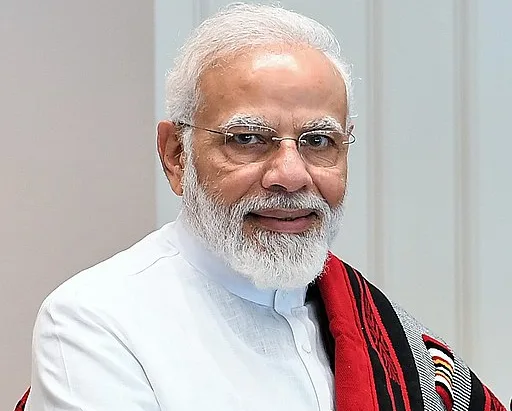In a rally in Gohana, Prime Minister Modi criticizes Congress for infighting and opposes their stance on reservations, urging voters to choose stability with BJP in the upcoming assembly elections
Prime Minister Narendra Modi delivered a fiery address at a poll rally in Gohana, Haryana, on Tuesday, where he outlined the stakes of the upcoming assembly elections scheduled for October 5. He asserted that if the Congress party were to come to power, even by mistake, it would jeopardize the state’s stability and development due to internal strife within the party. Modi characterized the Congress as plagued by infighting, claiming that this internal discord would lead to chaos and harm the interests of the people of Haryana.
Modi pointed out the instability associated with Congress governments in various states, citing Karnataka as an example, where he claimed the chief minister and deputy chief minister were embroiled in their conflicts rather than addressing the concerns of the citizens. He further referred to similar issues in Telangana, Himachal Pradesh, Rajasthan, and Chhattisgarh, warning the people of Haryana to remain vigilant against a potential Congress-led government.
He emphasized that the rising infighting within Congress was evident for all to see, stating, “The way infighting is rising in Congress, the entire Haryana is watching.” He cautioned that voting for Congress would threaten Haryana’s stability, leading to economic repercussions such as halted investments and job losses. Modi also pointed out the discontent within the Congress ranks, particularly mentioning prominent Dalit leader Kumari Selja’s unhappiness regarding ticket distribution, which has kept her away from the campaign.
Modi made a strong case against Congress’s historical opposition to reservation policies, asserting that opposing reservation is “in its DNA.” He alleged that Congress leaders, particularly from the “royal family,” have consistently worked against the rights of Dalits and other marginalized communities. He contrasted this with the BJP’s commitment to inclusivity, citing examples of Dalit and OBC representation in leadership roles, such as the appointment of Nayab Saini as the chief minister.
During his speech, Modi highlighted the BJP’s achievements in Haryana, boasting about the state’s advancements in industry and agriculture. He claimed that under his government, Haryana has become an attractive destination for investment, ultimately benefiting the poorer sections of society. The Prime Minister reflected on his recent trip to the U.S., where he discussed Indian youth’s talents with prominent global leaders, further asserting that industrialization would uplift farmers and create job opportunities for their children.
In conclusion, Modi confidently stated that support for the BJP was growing in Haryana, asserting, “Today, entire Haryana is saying ‘Phir ek baar, BJP sarkar.'” He also paid tribute to Pandit Deendayal Upadhyaya, drawing inspiration from him as the BJP aims to elevate the nation and empower the impoverished.
Analysis:
Political Perspective:
Prime Minister Modi’s rally underscores the intense political climate in Haryana as the state approaches assembly elections. By framing the Congress party as a harbinger of instability, Modi aims to consolidate voter support for the BJP. His rhetoric regarding internal conflicts within Congress serves to paint the opposition as ineffective and incapable of governance. This strategy reflects a broader political narrative employed by the BJP to reinforce its image as a stable and development-focused party. Moreover, the Prime Minister’s emphasis on the party’s historical opposition to reservation policies is a calculated move to secure the votes of marginalized communities who are central to the electoral landscape.
Social Perspective:
Modi’s remarks on the Congress party’s stance towards reservation reveal the social tensions surrounding caste dynamics in India. By accusing Congress of opposing reservation, Modi seeks to galvanize support from Scheduled Castes (SC), Scheduled Tribes (ST), and Other Backward Classes (OBC), who have historically benefited from such policies. His claims resonate with voters who perceive the BJP as a champion for their rights, reinforcing social identity politics that are crucial in Indian elections. This also highlights the ongoing societal debate around affirmative action and its implications for social equity, showcasing how political narratives shape public perception and mobilization.
Racial Perspective:
While Modi’s address primarily revolves around caste and reservation, the implications of his statements extend to discussions of racial dynamics in India. The historical marginalization of Dalits and other disadvantaged groups intersects with broader themes of racial identity and representation. By positioning the BJP as a party that empowers these communities, Modi not only addresses local electoral concerns but also taps into national dialogues about equality and justice, echoing sentiments of empowerment and inclusion that resonate across various marginalized groups.
Gender Perspective:
The discourse surrounding Congress’s internal conflicts includes an implicit critique of female leaders like Kumari Selja, a prominent Dalit politician. Modi’s mention of her discontent regarding ticket distribution highlights the gender dynamics at play within political parties. While Modi emphasizes the BJP’s inclusivity, the sidelining of female leaders in Congress raises questions about the representation of women in Indian politics. This narrative suggests that the BJP may leverage claims of better opportunities for women to attract female voters, underscoring the importance of gender considerations in electoral strategies.
Economic Perspective:
Modi’s focus on economic stability and development is a cornerstone of his political strategy. By linking Congress’s potential governance to economic instability, he aims to position the BJP as a party that promotes industrial growth and job creation. His assertions about attracting investment and enhancing agricultural productivity appeal to voters concerned about economic prospects. However, the underlying challenge remains: can the BJP deliver on its promises? As the economy grapples with challenges like inflation and unemployment, the credibility of such claims will be scrutinized by the electorate. Modi’s rally, therefore, reflects not only an electoral strategy but also a broader economic vision that seeks to capitalize on local and national aspirations for growth.
